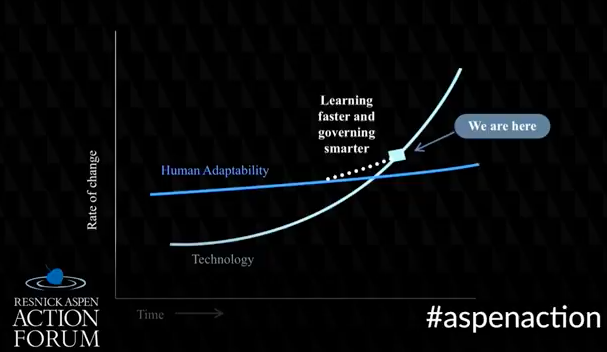The future of humanity will depend on our ability to adapt to and work with technology and the way through to this goal is lifelong learning, author Thomas Friedman said at the Resnick Aspen Action Forum earlier this week.
In a video from The Aspen Institute, Friedman described this future through a conversation he had with Google X’s Astro Teller while researching for his new book Thank You for Being Late: An Optimist’s Guide to Thriving in the Age of Acceleration. Teller drew Friedman a graph which showed the rate of human adaptation versus rate of technological change over time and where we are at our point in history.

The concepts behind the graph, which WorkingNation detailed in our “Slope of the Curve” animated short, show that our ability to adapt was surpassed by the rate of technological change, which is constantly in a state of acceleration according to Moore’s Law.
RELATED: “The Slope of the Curve” by Marshall CurryRight now, Teller noted to Friedman, advances in automation and artificial intelligence risk leaving a significant portion of humanity behind, but by “learning faster and governing smarter,” we can attempt to catch up. Friedman said that a quiet revolution is underway across the country as corporations and governments are innovating new ways to train workers and transforming education into a lifelong pursuit of skills and knowledge.
“There is massive innovation going on in this country on the pipeline of education to work. So much so that I almost thought of writing a book just about that. And no-one is telling anybody,” Friedman said.
The groundwork for adaptation, Friedman said, is happening at places like Qualcomm, where “The Internet of Things” tech is connecting all systems and turning janitors into tour-giving “maintenance technologists.” AT&T is assessing the skills of its workforce and providing training opportunities to improve skillsets through nano-degree online courses.To incentivize this off-hours learning, Friedman said AT&T’s “social contract” with its workforce means it must use the technology and educational support provided or enjoy the severance package on the way out. The digital divide will be no longer be applicable as technology seeps further into the everyday aspects of life, it will be replaced by a “motivational divide” separating whomever is willing to learn from the non-learners, Friedman said.
“That is a social contract that is coming to a neighborhood near you,” Friedman said, “My teacher and friend Heather McGowan points out that the days when you could get a four-year degree or six-year degree and dine out for 35 years on that knowledge? That is so gone in the age of acceleration.”
Friedman asserted that mainstream politics and news coverage downplays the threat of the technological skills gap upon the American workforce, but he added that our best thinkers and companies are already hard at work on overcoming it. “There is so much going on that nothing has to be invented. Whatever you can think of, I will show you somebody has thought of it and is implementing it,” Friedman said. The big takeaway from Friedman’s comments is that while the world may be slow to adjust to the breakneck speed of this latest industrial revolution, technology can allow us to keep pace, for the time being. To get more of Friedman’s reporting about automation, check out this podcast “Navigating the Future of Work,” from Deloitte University Press from July 26. Join the Conversation: Watch the video and tell us about what you think of Friedman’s ideas on adapting to technological change on our Facebook page.© Copyright 2024 by Structural Unemployment, LLC dba WorkingNation